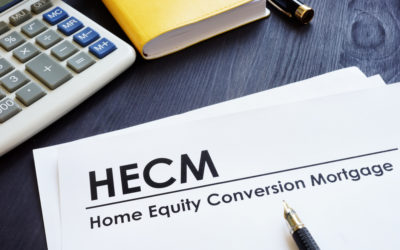Reverse mortgages can be a helpful way to fund your retirement. For many seniors, finding a workable retirement income solution can be a challenge. Between the costs of living, the prices of maintaining a home, and medical bills, having a source of income that you can consistently rely on in retirement is essential.
In this post, you’ll find reverse mortgages for seniors explained: what they are, how a reverse mortgage for seniors works, what you can use them for, and more.
KEY TAKEAWAYS
- Reverse mortgages are an innovative way for seniors to fund their retirement by tapping into accrued home equity.
- This form of loan allows borrowers to stay living in their homes throughout their retirement, only requiring repayment after a designated maturation event.
- To qualify, borrowers must be 62 or older, own substantial equity in their home, live in the property as a primary residence, and abide by FHA guidelines.
- Reverse mortgages can be HECM loans (a federally insured program), jumbo reverse mortgages, or single-purpose reverse mortgages.
If you’ve never heard of a reverse mortgage for senior citizens, we’ll start with a simple explanation.
What is a reverse mortgage for seniors?
A home reverse mortgage is a type of mortgage loan product that allows eligible borrowers to convert a portion of their home equity into loan proceeds that can be used as a source of retirement cash flow. Reverse mortgages are also commonly called home equity conversion mortgages — or HECM loans, the name for the federal program that insures a large portion of reverse mortgages.
- Did you know that almost half of adults over the age of 55 have no retirement savings? If you’re worried you don’t have enough saved up, a reverse mortgage may help. Read our guide to find out how long your retirement savings will last.
Reverse mortgages differ from traditional mortgages. While borrowers make monthly payments on a traditional mortgage, no monthly payments are required on a reverse mortgage during the course of the loan — instead, payments are made to the borrower.
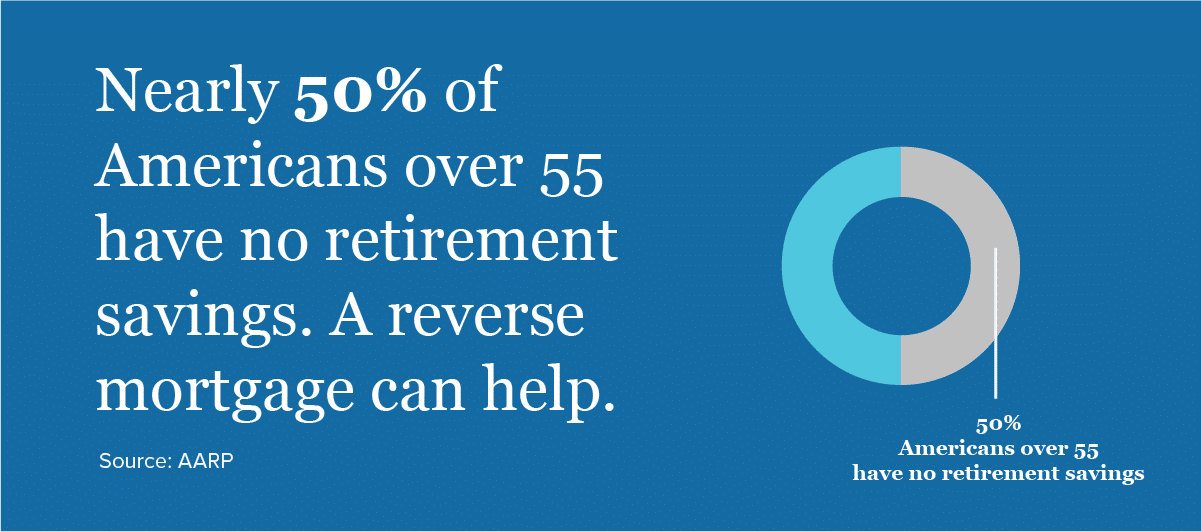
Throughout the course of the loan, the home is used as collateral. The loan must be repaid when it reaches a maturity event that signals its Due and Payable status — usually, this is the death of the borrower or the borrower’s departure from the property. Until a maturity event, borrowers continue living in the home while enjoying proceeds secured by their home equity — all without the requirement of monthly repayments.
Reverse mortgage proceeds may be used for any purpose as long as homeowners pay their property taxes, repairs, and insurance. To determine if a home equity conversion mortgage is the best option for your retirement needs, you should be aware of the following features:
- Borrowers may take advantage of the equity of their properties without having to sell or vacate the premises. This may be particularly beneficial for seniors who wish to continue to live in their homes.
- HECMs are non-recourse, federally guaranteed loans. This means that if a borrower owes more than the home is worth, they (or their remaining heirs) will not be required to pay the difference; instead, they will only be required to repay the loan balance or 95% of the home’s appraised value, whichever is less.
- Borrowers do not have to make monthly loan payments. An HECM loan only becomes Due and Payable when a maturity event occurs.
- HECM loans offer a flexible structure; proceeds may be received in the form of a lump sum, monthly payments, a line of credit, or a combination.
If you think a reverse mortgage may be suitable for your retirement, it’s important to review eligibility requirements.
What are the qualifications for a reverse mortgage?
The HECM program is insured and overseen by divisions of the Federal Government: the Department of Housing and Urban Development (HUD), and the Federal Housing Administration (FHA). These Federal agencies determine requirements for reverse mortgages administered through the HECM program. (Requirements on reverse mortgages not administered through the HECM program can vary — see the Jumbo Reverse Mortgages section for more information on that topic.)
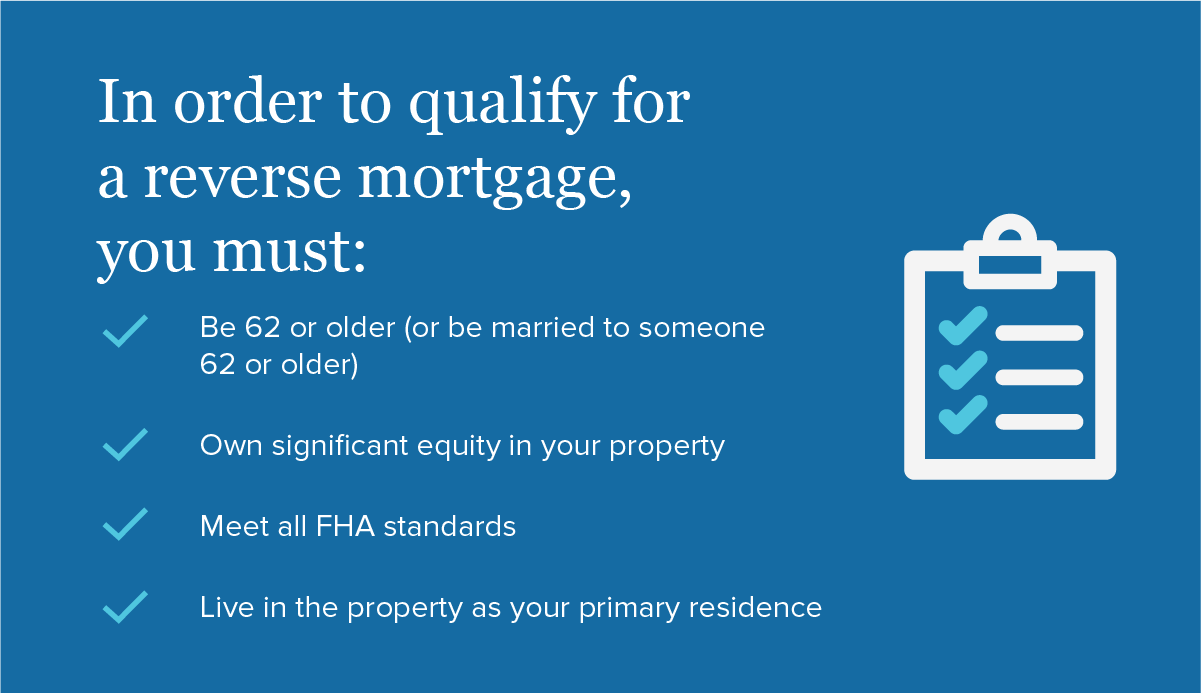
HECM requirements include:
- Borrowers must be at least 62 years old (spouses may be younger if the primary borrower is over 62)
- Borrowers must have substantial equity in their home, usually over 50%
- Borrowers must meet with a HUD-approved third-party counselor
- Borrowers must occupy the mortgaged property as their primary residence
- Borrowers must remain current on all debts and other financial obligations
- Borrowers are required to maintain their home in accordance with all FHA standards
For more information on eligibility, check out the GoodLife reverse mortgage eligibility page. It can help you better understand whether you qualify for the HECM program, and what your next steps might be. If you still have questions, you can always speak with a GoodLife Reverse Mortgage Specialist, who is equipped to answer more specific questions.

In addition to meeting the requirements, applicants must complete the application process. GoodLife’s reverse mortgage application process is fast, painless, and easy for potential borrowers to understand. There are four simple steps that take you from the application phase to receiving your proceeds:
- Education: You can start by reading up on reverse mortgages on our website, then speaking with a Reverse Mortgage Specialist to help you better understand the world of HECM loans.
- Counseling: Following that, all HECM applicants must meet with a counselor who has been approved by HUD. In order to assist you in making the best decision possible, the counselor must be a neutral third party.
- Application: After the advisor has given his or her approval, you will be able to apply for the loan. During this part of the process, an FHA-approved appraiser will come to your home to value it and ensure compliance.
- Funding: After your application has been accepted, you may begin to receive funds in the form of a lump sum, monthly payments, or a line of credit.
If you’re considering a reverse mortgage for senior citizens, it’s important to know what your different options are. Let’s take a look at the different kinds of reverse mortgages for seniors that are available.
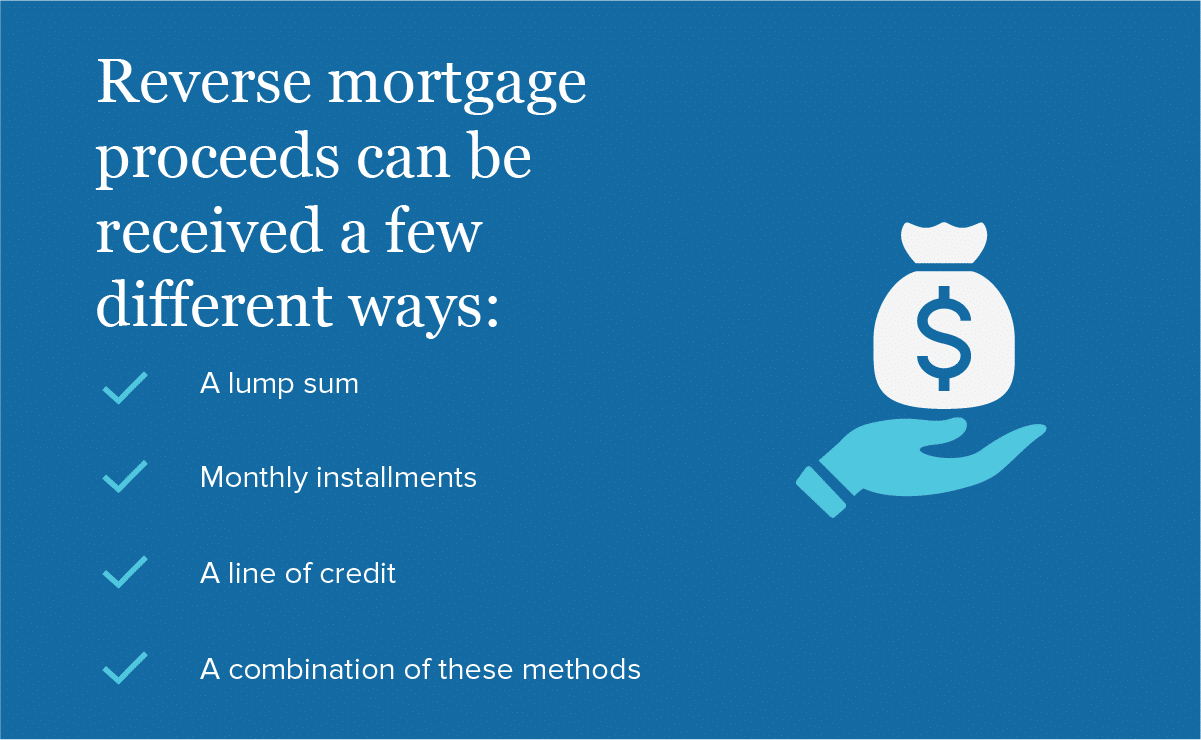
Types of reverse mortgages
HECM reverse mortgage
One of the most common forms of reverse mortgages is the HECM loan. That’s because they’re an effective way to fund seniors’ retirement, and they’re subsidized by the government and supervised by the Federal Housing Administration (FHA) to ensure that buyers get a good deal. At GoodLife, we specialize in HECM loans, which enable retirees to tap into the equity in their homes at competitive rates.
As mentioned before, because HECM loans are federally-backed, they have stricter requirements. One of those requirements is the maximum claim amount. The maximum claim amount in 2022 is $970,800. That means that borrowers may not use an HECM loan on equity valued higher than that amount.
If your home is valued at a greater value than the maximum claim amount, it may be worth considering a jumbo reverse mortgage.
Jumbo reverse mortgage
Private reverse mortgages are often called jumbo reverse mortgages, as they can be used to fund loans on homes worth more than the maximum claim amount. The federal government does not insure private reverse mortgages. This enables private lenders to circumvent many of the rules that apply to HECM loans, as well as allowing borrowers to receive a reverse mortgage that they might not be eligible for by applying for an HECM loan, such as those where the value of the home exceeds the maximum claim amount.
Individual lenders can have their own conditions for borrowers, even though private reverse mortgages are not subject to several of the federal regulations that regulate HECM loans. These conditions may also echo FHA requirements for HECM loans, such as the minimum age requirement for borrowers. Ultimately, it depends on the policies that individual lenders have in place.
To find out whether a jumbo reverse mortgage is right for your situation, it’s a good idea to start by speaking with a GoodLife Reverse Mortgage Specialist.
Getting Started with Reverse Mortgages
If you’re looking to get started with a reverse mortgage, these articles can help guide you through all aspects of the process.
Guide to HECM Loan Reverse Mortgage Limits
Single purpose reverse mortgage
Single purpose reverse mortgage loans are a smaller program than the HECM loan program. They are a form of reverse mortgage that allows homeowners to borrow funds for a specific purpose: like renovating their home, adding accessibility upgrades, or weatherproofing — or financial costs like property taxes and home insurance premiums.
Single-purpose reverse mortgages are often offered in smaller amounts than full HECM or jumbo reverse mortgages, due to the fact that they only cover the specific use the borrower has in mind. Single-purpose reverse mortgages can also be simpler to obtain for borrowers than other types of reverse mortgages due to their lower valuation and higher criteria.
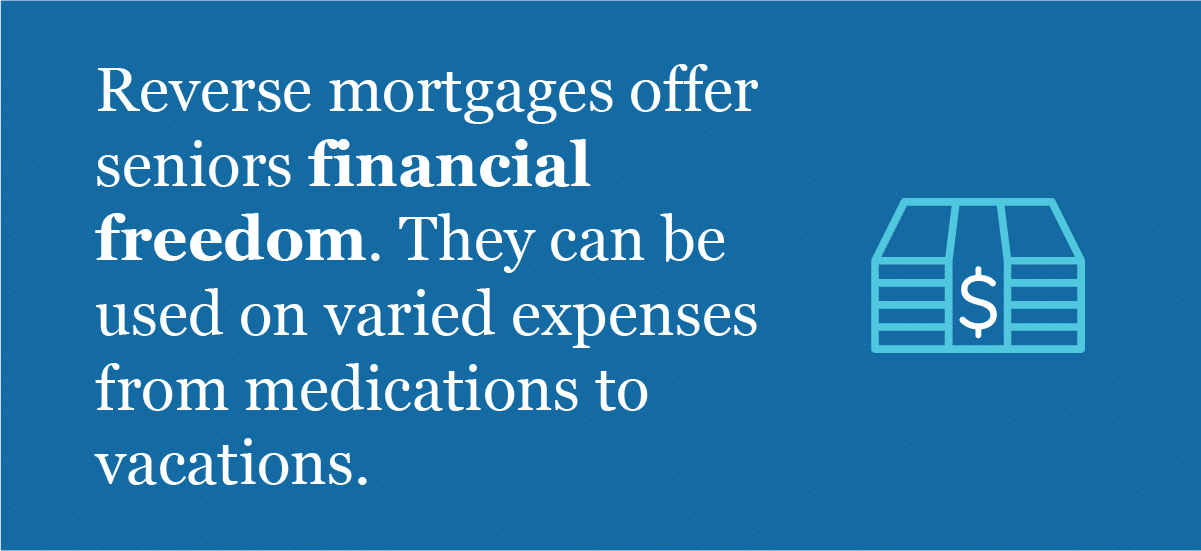
How can seniors use reverse mortgages?
The money from an HECM or jumbo reverse mortgage can be used for a variety of purposes, including the following:
- Supplemental source of retirement income alongside fixed sources like Social Security or pensions
- Aid in paying medical bills, regular copays, deductibles, and devices
- Covering daily costs like groceries, clothing, and home goods
- Funding repairs, renovations, and accessibility upgrades to your home
- Financing leisure, hobbies, travel, and other retirement fun
If you are curious to find out more about this source of retirement funding, be sure to read through GoodLife’s reverse mortgage guide. The free download offers an in-depth guide to everything you need to know about the HECM plan. And if you have any additional concerns, you can always contact one of our Reverse Mortgage Specialists.

 1-866-840-0279
1-866-840-0279
